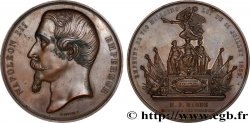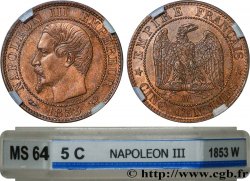fme_890573 - SECOND EMPIRE Médaille de Baptême, Communion et Confirmation
100.00 €(Approx. 104.00$ | 83.00£)
Quantity
Add to your cart

Type : Médaille de Baptême, Communion et Confirmation
Date: 1853-1864
Metal : copper
Diameter : 68,5 mm
Orientation dies : 12 h.
Engraver OUDINÉ Eugène-André (1810-1887)
Weight : 142,95 g.
Edge : gravée : FILS DE JEAN BARTHE, D.R MED.N CH.EN DE 1.E CLASSE ED LA MARINE IMP.LE (légion d’honneur) ET DE MARIE BARTHE NEE DE SANDFORT. + abeille CUIVRE
Puncheon : Abeille (1860 - 1880) CUIVRE
Coments on the condition:
Médaille ayant été nettoyée, présentant des taches d’oxydation. De l’usure sur les reliefs. Présence de coups et rayures
Obverse
Obverse legend : CELUI. QUI. MANGE. MA. CHAIR. ET. BOIT. MON. SANG. A. LA. VIE - ETERNELLE. ET. JE. LE. RESSUSCITERAI. AU. DERNIER. JOUR. .
Obverse description : Christ dans une architecture gothique, entre deux anges tenant des enfants agenouillés, chacun sous un palmier. Signé : ARTHUR. MARTIN. S. INV. + EUG. AND. OUDINE SCULP // ANGER - EDIT.
Reverse
Reverse legend : JE. RENONCE. A. SATAN. A. SES. POMPES. A. SES. OEUVRES. ET. JE. M’ATTACHE. A. JESUS. CHRIST. POUR. TOUJOURS. // QVIS. VT.DEVS - AVE. MARIA // EDMOND / BARTHE // BAPTEME18 JUIN 1853 / PREM. COMMUNION 29 MAI 1864 / CONFIRMATION 19 JUIN 1864.
Reverse description : Scène du Saint Esprit qui surplombe un autel, un livre ouvert gravé IHS et XPS, encadré par des anges, celui de gauche terrasse un dragon tandis que celui de droite tient une fleur de lis. Signé : E. A. OUDINE et A. MARTIN.
Commentary
Médaille décernée à Edmond Barthe, fils de Jean Barthe, docteur médecin dans la Marine Impériale et récipiendaire de la Légion d’honneur, et de Marie Barthe, née de Sandfort.








 Report a mistake
Report a mistake Print the page
Print the page Share my selection
Share my selection Ask a question
Ask a question Consign / sell
Consign / sell
 Full data
Full data









